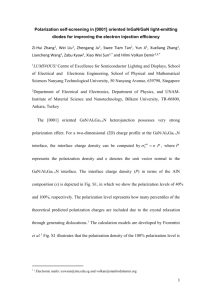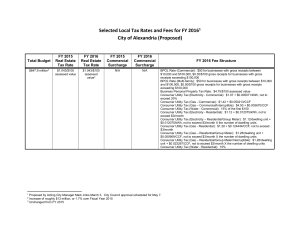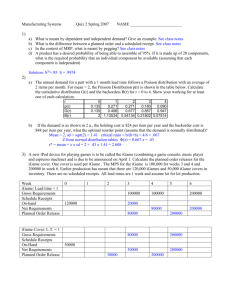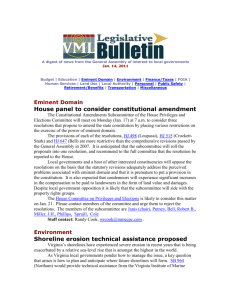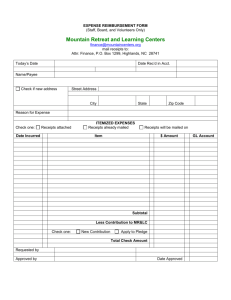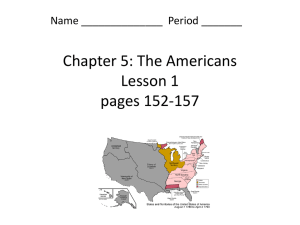History of King William County BPOL tax? The BPOL tax began
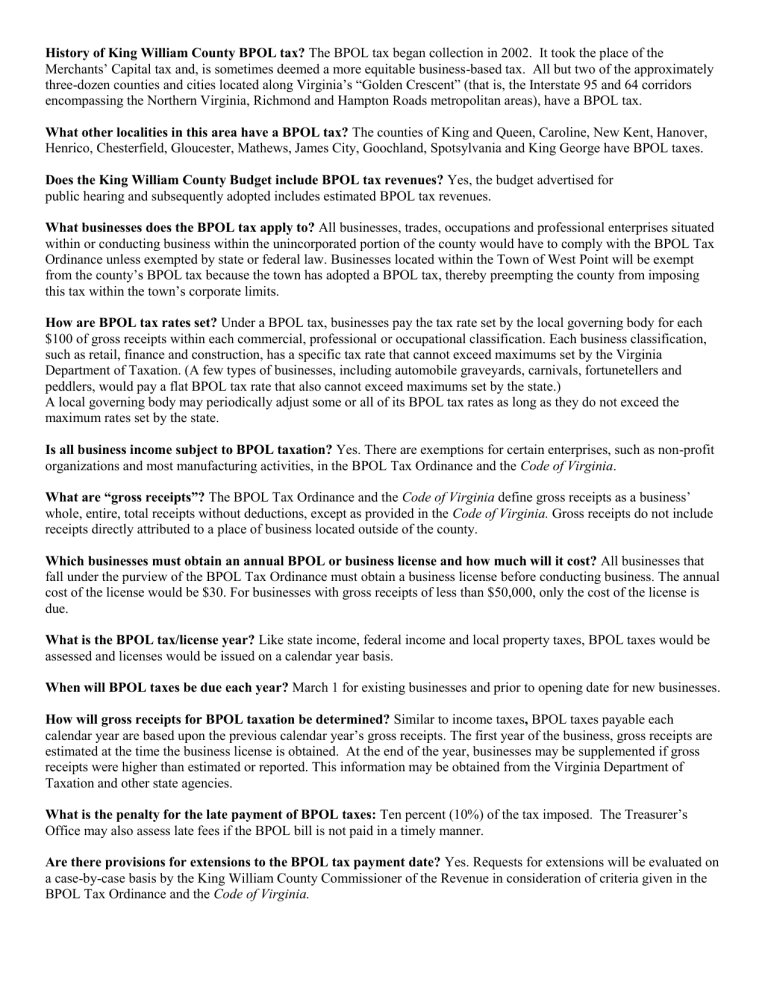
History of King William County BPOL tax? The BPOL tax began collection in 2002. It took the place of the
Merchants’ Capital tax and, is sometimes deemed a more equitable business-based tax. All but two of the approximately three-dozen counties and cities located along Virginia’s “Golden Crescent” (that is, the Interstate 95 and 64 corridors encompassing the Northern Virginia, Richmond and Hampton Roads metropolitan areas), have a BPOL tax.
What other localities in this area have a BPOL tax? The counties of King and Queen, Caroline, New Kent, Hanover,
Henrico, Chesterfield, Gloucester, Mathews, James City, Goochland, Spotsylvania and King George have BPOL taxes.
Does the King William County Budget include BPOL tax revenues? Yes, the budget advertised for public hearing and subsequently adopted includes estimated BPOL tax revenues.
What businesses does the BPOL tax apply to? All businesses, trades, occupations and professional enterprises situated within or conducting business within the unincorporated portion of the county would have to comply with the BPOL Tax
Ordinance unless exempted by state or federal law. Businesses located within the Town of West Point will be exempt from the county’s BPOL tax because the town has adopted a BPOL tax, thereby preempting the county from imposing this tax within the town’s corporate limits.
How are BPOL tax rates set? Under a BPOL tax, businesses pay the tax rate set by the local governing body for each
$100 of gross receipts within each commercial, professional or occupational classification. Each business classification, such as retail, finance and construction, has a specific tax rate that cannot exceed maximums set by the Virginia
Department of Taxation. (A few types of businesses, including automobile graveyards, carnivals, fortunetellers and peddlers, would pay a flat BPOL tax rate that also cannot exceed maximums set by the state.)
A local governing body may periodically adjust some or all of its BPOL tax rates as long as they do not exceed the maximum rates set by the state.
Is all business income subject to BPOL taxation? Yes. There are exemptions for certain enterprises, such as non-profit organizations and most manufacturing activities, in the BPOL Tax Ordinance and the Code of Virginia .
What are “gross receipts”?
The BPOL Tax Ordinance and the Code of Virginia define gross receipts as a business’ whole, entire, total receipts without deductions, except as provided in the Code of Virginia. Gross receipts do not include receipts directly attributed to a place of business located outside of the county.
Which businesses must obtain an annual BPOL or business license and how much will it cost? All businesses that fall under the purview of the BPOL Tax Ordinance must obtain a business license before conducting business. The annual cost of the license would be $30. For businesses with gross receipts of less than $50,000, only the cost of the license is due.
What is the BPOL tax/license year? Like state income, federal income and local property taxes, BPOL taxes would be assessed and licenses would be issued on a calendar year basis.
When will BPOL taxes be due each year? March 1 for existing businesses and prior to opening date for new businesses.
How will gross receipts for BPOL taxation be determined? Similar to income taxes , BPOL taxes payable each calendar year are based upon the previous calendar year’s gross receipts. The first year of the business, gross receipts are estimated at the time the business license is obtained. At the end of the year, businesses may be supplemented if gross receipts were higher than estimated or reported. This information may be obtained from the Virginia Department of
Taxation and other state agencies.
What is the penalty for the late payment of BPOL taxes: Ten percent (10%) of the tax imposed. The Treasurer’s
Office may also assess late fees if the BPOL bill is not paid in a timely manner.
Are there provisions for extensions to the BPOL tax payment date? Yes. Requests for extensions will be evaluated on a case-by-case basis by the King William County Commissioner of the Revenue in consideration of criteria given in the
BPOL Tax Ordinance and the Code of Virginia.
How does the BPOL Tax Ordinance affect business compliance with zoning and other development codes? New businesses and expansions to existing businesses have to comply with current zoning, building and other development codes. The BPOL Tax Ordinance does not retroactively require or result in existing businesses, which were legally established under the laws that existed at the time of their establishment, to comply with zoning, building and other development codes adopted or amended after their establishment. This non-retroactivity standard applies to home occupations as well as other, larger business enterprises. Legal “grandfathering” and “vesting” rights were not affected by the adoption of the BPOL Tax Ordinance.
How will the county use the BPOL tax revenues? The BPOL tax receipts supplement existing local revenue sources to fund current costs as well as increasing capital and operating requirements necessitated by a growing population, unfunded state and federal mandates, and reductions in state aid to localities.
Who should be contacted regarding questions about the BPOL tax ordinance? Beth Dandridge, Financial Specialist,
Commissioner of the Revenue Office. Physical address: County Administration Building, 180 Horse Landing Road (State
Route 619), King William Court House. Mailing address: Post Office Box 217, King William, Virginia 23086. Telephone:
(804) 769-4965. Facsimile: (804) 769-4964. E-mail: bdandridge@kingwilliamcounty.us
.
